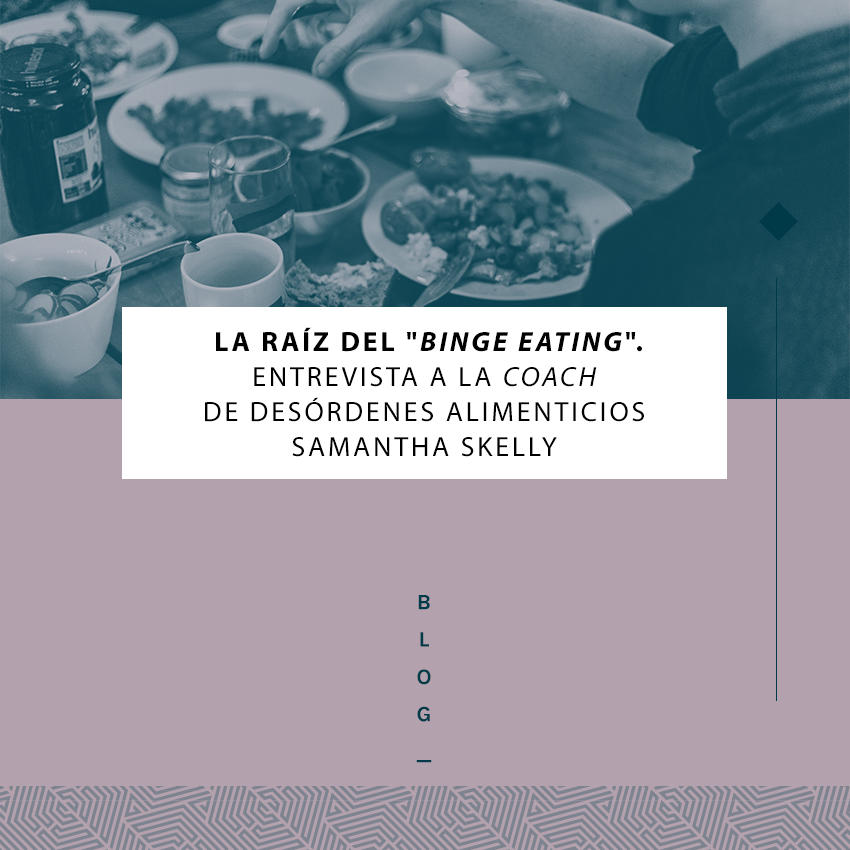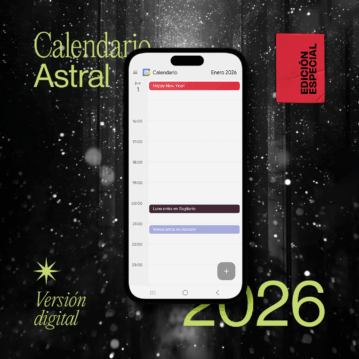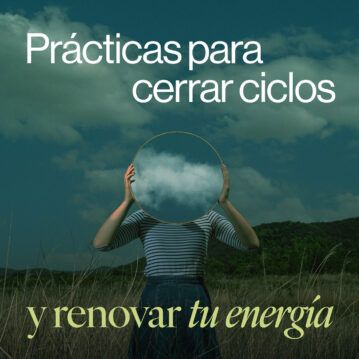
La raíz del “Binge eating”. Entrevista a la coach de desórdenes alimenticios Samantha Skelly
¿Te gustó este contenido? Haz clic en me gusta y consulta de nuevo, cuando quieras, en la sección de Mis Favoritos
¿Qué motiva la compulsión por consumir alimentos de manera excesiva? Esta pregunta ha sido un disparador para el trabajo de Samantha Skelly, coach de desórdenes alimenticios, emprendedora y creadora del movimiento Hungry for Happiness (Hambrientos de felicidad), en el cual ayuda a personas a atravesar el proceso de una verdadera transformación que les ayuda a cambiar los patrones y creencias relacionados a los alimentos, la imagen física y el amor propio.
Acá conversamos sobre su historia, lo que la llevó a conocerse y cómo se motivó a ayudar a otros. Scroll down to read the original version in english.
P
Cuéntanos tu historia: ¿cómo te convertiste en una coach certificada en desórdenes alimenticios?
R
Viví la batalla. Lidié con problemas con los alimentos y la imagen corporal por años. Literalmente, probé unas 50 dietas en menos de cuatro años y fallé en cada una de ellas. Intenté arreglar mis problemas, pero solo me llevaba a obsesionarme más con la comida, restringirme y sobre-ejercitarme para balancear mi binge eating (comer en exceso). Finalmente, alcancé un punto donde me di cuenta que mi lucha no tenía que ver con la comida. Comencé a indagar en mis problemas y descubrí el dolor emocional que se ocultaba debajo y que me llevaba a buscar en la comida confort y adormecimiento de lo que sentía. A partir de allí, fui a la escuela para certificarme como coach en el área de alimentos y cuerpo, desde entonces he estado usando mi experiencia propia para ayudar a otras mujeres alrededor del mundo a sanar su relación con su físico y la comida.
P
Si alguien piensa que puede estar lidiando con un desorden alimenticio, ¿qué es lo primero que le recomendarías hacer?
R
Primero necesitan estar conscientes de la intención detrás del consumo. ¿Por qué están comiendo esa comida? ¿Estás verdaderamente hambriento o estás intentando sentirte de alguna manera lo más rápido posible? Con frecuencia cuando lidiamos con problemas de alimentación y apariencia física, o cuando caemos en comer de manera compulsiva, lo que estamos buscando es un cambio acelerado de estado, que nos permita adormecer o suprimir los “sentimientos malos”. También sugeriría que comience a indagar en su motivación de intentar cambiar su estilo de vida y bajar de peso, ¿está basada en el amor o el miedo? Usualmente cuando nos llevamos al límite de restringir alimentos y meternos en un régimen alocado de ejercicios, lo estamos haciendo por miedo: a ser gordos, a ganar peso o no vernos “cómo deberíamos”. Para realmente sanar tu desorden alimenticio, debes partir de un lugar de amor. Haz este trabajo porque te amas y quieres vivir una vida que te encienda. Hazlo porque quieres que tu cuerpo esté fuerte, sano y lleno de energía.
P
En tu práctica, ¿cúal es el desorden alimenticio más común?
R
Binge eating o comer de manera compulsiva, ese es el problema más común que vemos en nuestros clientes.
P
Realmente, ¿de qué tenemos hambre?
R
- Autoaceptación.
- Amor propio y autocompasión.
- Conexión (con nosotros, con otros, con quien verdaderamente somos).
- Paz interna y fluir con facilidad con la vida.
P
¿Cómo puede una persona con un desorden alimenticio comenzar a hacer un cambio de vida?, ¿dónde comenzar además de yendo a terapia?
R
Creo que debes comenzar por encontrar recursos que realmente resuenen contigo en un nivel profundo. La dieta que es tendencia en el momento no es algo que vas a mantener a largo plazo. Necesitas abordar el problema con más profundidad. Todo comienza con las emociones. Otra cosa a tener en mente es encontrar una manera de integrar lo que aprendes. Puedes leer cada libro sobre desórdenes alimenticios, escuchar todos los podcast, unirte a todos los grupos, pero si no estás poniendo ese conocimiento en acción a diario, no vas a ver una transformación real y duradera. Tenemos muchos recursos y tips sobre cómo sobrellevar esa lucha en nuestra página web.
P
¿Cuánto interfiere un desorden alimenticio en nuestro deseo de amar y ser amados?
R
Los desórdenes alimenticios tienen un gran impacto en cómo buscamos amor y conexión. Como seres humanos estamos cableados para buscar conexión y amor, pero cuando estamos luchando con problemas con la alimentación y el cuerpo, usualmente hay mucha verguenza y un sentimiento de no merecer. Es muy común en mujeres con desórdenes alimenticios que se aíslen socialmente y eviten la intimidad y la conexión. Cuando fundamentalmente sentimos que no somos merecedores (de amor, felicidad o de nuestros deseos en general), amarnos y amar a otro es un gran reto.
P
¿Cuánto han impactado las redes sociales en este tema?
R
La comparación vía redes sociales es un gran factor en minimizar nuestra imagen personal y valor. Nos pone en un espacio mental de “no soy lo suficientemente buena, no soy lo suficientemente bonita, no soy lo suficientemente flaca, etc”. Industrias como las de los productos de pérdida de peso juegan con nuestras inseguridades para generar ganancias. Algo que me gusta decirle a mi comunidad es que filtren a quién siguen, que estén más conscientes de cómo se sienten cuando estén revisando su Instagram o Facebook. Si hay una cuenta de fitspo (inspiración fit) o gente que sigues que te hace sentir mal por como eres o despiertan sentimientos negativos, deja de seguirlo. Tu mundo externo sólo debería agregar valor a tu mundo interno.
P
¿Cómo podemos ser parte de este movimiento de bienestar?, ¿cómo podemos ayudarnos los unos a los otros?
R
Creo que empieza con la compasión, por nosotros y por otros. Estamos todos haciendo lo mejor que podemos, con lo que tenemos en cualquier momento. Creo que ahora el mundo está muy dividido por tantas razones diferentes, y hay muchos juicios que nos son impuestos, pero si intentáramos vernos y ver a otros con ojos de compasión y curiosidad, ¿qué pasaría?
P
Cuéntanos sobre tu misión de acabar con las dietas. ¿A quién aplica esto?
R
Es nuestra misión ayudar a 1 millón de personas a acabar con las dietas para el 2020, a través del entrenamiento de coaches de bienestar con métodos que se enfocan en lo emocional y energético. Muchas de las “soluciones rápidas” que ves realmente no funcionan, en especial a largo plazo, porque solo se enfocan en los comportamientos externos. Debemos comenzar a trabajar con las creencias internas, así es como podemos ayudar a la gente a sanar y dejar las dietas. Necesitamos entender por qué están recurriendo a la comida y partir de allí.
La manera en la que hacemos este trabajo para ayudar a la mayor cantidad de gente posible es a través de nuestro Programa de Certificación de Coaches. Me he dado cuenta de que no puedo ser yo solamente quien le haga coaching a las personas y cambiar el mundo, necesito de otros sanadores y líderes que den un paso adelante y se unan a hacer este trabajo a gran escala. Es a través del coaching emocional que podemos ayudar a las personas a tener una verdadera transformación, así podrán regresar a ellos mismos, vivir su verdad, y tener una vida que les encienda.
Quiero trabajar con quien sea que sienta un fuego dentro de sí cuando lee nuestra misión y visión. Muchos de nuestros coaches actuales en entrenamiento y alumnos han batallado personalmente con problemas de alimentación e imagen personal en el pasado, así que esta meta es muy personal para ellos, pero nuestro programa está abierto a cualquiera que desee convertirse un “rockstar coach” del nicho de alimentación y físico.
P
¿Dónde podemos encontrarte?
R
Puede visitar nuestra página web www.hungryforhappiness.com. También en mi Instagram personal Instagram: @samanthaskelly y el del programa @hungryforhappines. En Facebook también encuentras mi página personal: Samantha Skelly y la de Hungry for Happiness.
English version
Q
Tell us your story: how did you become a certified coach in eating disorders?
A
I went through the battle myself. I struggled with food and body for years. I literally went on 50 diets in under four years, and I failed at every single one of them. I tried to fix my issues but it just led to more and more obsession over food and trying to restrict myself and over-exercise to balance out my binge eating. Finally, I reached a point where I realized my struggle had NOTHING to do with food. I began to dig deeper into my issues and discovered the underlying emotional pain that was causing me to turn to food for comfort and to numb out. From there, I went to school to become a certified coach in the food and body space, and since then, I’ve been using my own experience to help women around the world heal their relationship to food and body.
Q
If somebody is thinks is dealing with an eating disorder, what id The first thing you recommend?
A
First they need to become aware of their intention behind consumption. WHY are you eating that food? Are you genuinely hungry? Or are you trying to FEEL a certain way as quickly as possible? Often, when we struggle with food and body, when we go into binge mode, what we’re actually seeking is a quick state change to numb out or suppress “bad” feelings. I would also suggest that you begin to dig into your motivation to try and change your lifestyle and lose weight. Is it founded in love or fear? Usually when we push ourselves to restrict food and stick to a crazy exercise regimen, we’re doing it out of fear – fear of being fat, of gaining weight, of not looking how we think we “should.” In order to truly heal your disordered eating, you need to come at it from a place of love. Do this work because you love yourself and you want to live a life that truly lights you up. Do it because you want your body to be strong, healthy, and energetic.
Q
In your practice, what is the most common eating disorder?
A
Binge Eating Disorder is the most common issue that we see with our clients.
Q
What are we really hungry for?
A
- Self-acceptance
- Self-love and self-compassion
- Connection (with ourselves and others, for who we TRULY are)
- Inner peace and an ease and flow to life
Q
How can a person with an eating disorder start making a life change? where to begin besides therapy
A
I think you need to find resources that really resonate with you on a deeper level. The fad diet of the moment is not something you’re going to stick with long-term. You need to approach your struggle on a much deeper level. It all starts with emotions. Another thing to keep in mind is find a way to integrate what you learn. You can read every book on eating disorders, listen to all the podcasts, join all the groups, but if you’re not actually putting what you learn into action on a daily basis, you’re not going to see real, lasting transformation. We have tons of resources and tips on how to overcome this struggle at our website.
Q
How much an eating disorder interferes with our desire for love and be loved?
A
Disordered eating has a huge impact on if and how we seek love and connection. As humans, we are hardwired to seek connection and love. But when we struggle with food and body, there is usually a lot of shame and a feeling of unworthiness that goes along with these issues. It’s very common for women who struggle with disordered eating to socially isolate themselves and avoid intimacy and connection. When we fundamentally feel like we are unworthy (of love, happiness, or our desires in general), then loving ourselves and being in love with another is a big challenge.
Q
How much social media has impacted us regarding this theme?
A
Comparison via social media is a huge factor in depleting our body image and self-worth. It puts us in that headspace of “not being good enough, pretty enough, skinny enough,” etc. and then industries like the weight loss industry play off of our insecurities to try and make a profit. Something I like to tell my community is to filter your feeds. Be more aware of how you feel when you’re scrolling through you Instagram feed or your Facebook dash. If there are fitspo accounts or people that you follow that make you feel bad about yourself or trigger negative feelings, then unfollow them! The external world should only add value to your internal world!
Q
How can we become the wellness movement, helping each other?
A
I think it all starts with compassion. Compassion for ourselves, and compassion for others. We are all doing the best we can, with what we have, in any given moment. I think right now the world is so divided for so many different reasons, and there’s a lot of judgment being thrown around. But if we tried to view ourselves and others through the lens of compassion and curiosity?
Q
Tell us about you mission to end dieting. Who can apply?
A
It’s our mission to help 1 million people end dieting by 2020 by training wellness coaches in emotional and energetic coaching methods. So many of the “quick fixes” that you see out there don’t really work–especially for the long term–because they only address external behaviors. We need to start with internal beliefs – that is how we are going to help people heal and stop dieting. We need to figure out WHY they are turning to food first, and then go from there.
The way that we do this work and help as many people as possible is through our Coach Certification Program. I’ve realized that I can’t just coach people on my own and really change the world, I need other healers and leaders to step up and join hands with me to do this work on a larger scale. It’s through emotional coaching that we are going to help people experience true transformation, so they can come home to themselves, own their truth, and finally live a life that lights them up.
I wanna work with anyone who feels a fire in their belly when they read our mission and vision. A lot of our current coaches in training and alums personally struggled with food and body in the past, so this mission is very personal for them, but our program is open to anyone who wants to become a rockstar coach in the food and body niche.
Q
Where can we find you?
A
Instagram: @samanthaskelly AND @hungryforhappines
Facebook: Samantha Skelly AND Hungry for Happiness
Te puede interesar: Entrevista al Dr. Adi Jaffe






